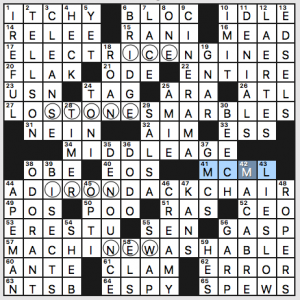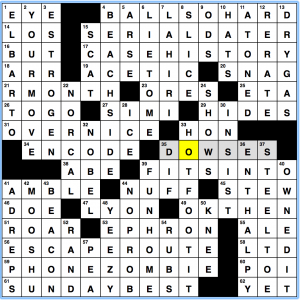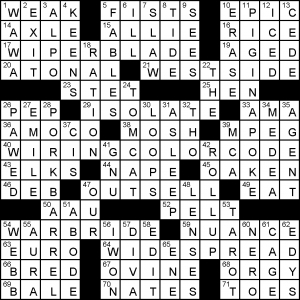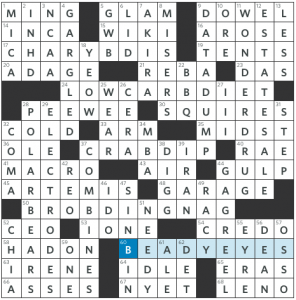Jules Markey’s New York Times crossword—Jenni’s write-up
I know not everyone loved this year’s ACPT puzzles. I enjoyed them; they are consistently among the highest-quality puzzles I encounter. Today’s NYT is – not.
We have four theme answers, with helpful circles, and a revealer.

NYT 3/29 puzzle, solution grid
- 17a [Things that power Teslas] are ELECTRIC ENGINES.
- 27a [Went bonkers] is LOST ONE‘S MARBLES.
- 44a [Lakeside furniture item] is the very comfy ADIRONDACK CHAIR, with the handy wide arms on which one can rest a drink, a crossword puzzle, or both.
- 57a [Label rarely seen on silk garments] is MACHINE WASHABLE.
What connects ICE, STONE, IRON, and NEW? We turn to 34a [Crisis time, for some … or a hint to each of the circled words]. This is in the middle of the grid, which is appropriate, and the answer is MIDDLE AGE. Ice age, stone age, iron age, new age. Nice theme – all the grid-spanning themers are solidly in the language, and I’m not bothered by the fact that three of the hidden words span two words and the other one doesn’t.
So I liked the theme. Why did I dis the puzzle in the first paragraph of this review? The fill. Oy, the fill.
- We start off at 1d with IREFUL for [Really angry]. I groaned when I filled this in, and David asked why. I explained. He said “That isn’t a word?” I said “Oh, I’m sure it’s in a dictionary somewhere, but it’s bad.” And it is.
- 19d [Make a snarling sound] is GNAR. Not a word we see every day, and for good reason.
- 25d [Female pen pal, maybe] is AMIE and the clue gives us no hint that it’s in French. Well, I guess we might infer an international correspondence from “pen pal,” but that’s a stretch. That’s a lot of inference for a Wednesday puzzle.
- 41a [Year the Korean War began] is MCML. I’m on record about Roman numerals in crosswords. I still don’t like them.
- 58d [C.T.A. transports] is ELS and I’m sure Amy has explained several times that no one in Chicago uses the plural. I know we’re all tired of Golfer Ernie, but at least he’s correct. (Editor’s note: And we say the “L.”)
There were some things I liked in the fill:
- 6d [Game for dummies?] is BRIDGE. Two people have asked me recently if I want to learn how to play. Maybe I should.
- 9d [Wide-screen movie format] is probably on someone else’s list of obscurities that don’t belong in the puzzle. I just think CINERAMA is a neat word. It sounds like the 1950s.
- 20a [Criticism, informally] is FLAK. Fun.
- 61a [Simoleon] is the equally slangy CLAM.
- More contemporary slang with 56a [ [OMG!] ] for GASP.
What I didn’t know before I did this puzzle: that the BEECH tree has triangular nuts. I stuck BETEL in, which gave me MIDDLEAST for the central revealer and left me thoroughly confused for a little while.
I leave you with a song clued at 54d and referenced in last Sunday’s NYT, so if you haven’t done that puzzle yet, look away!
https://www.youtube.com/watch?v=18sN3tz7PkM
Jeff Chen’s Wall Street Journal crossword, “What Are You Looking At?” — Jim’s review
It’s been a while since we’ve seen a Jeff Chen byline in the WSJ. The title hints that the theme might have a visual element to it (which is often the case in a Chen puzzle), but it’s not the case today.
Revealed by 60a [Ratlike feature, and a hint to a feature of the four starred answers], our theme is BEADY EYES, or, as they appear in the actual theme answers, BDIs. Cute, eh?
- 17a [*Monster of myth who took people for a spin] CHARYBDIS. I’ve heard the word but wouldn’t have been able to tell you if it was a place, a creature, or a person. But that’s a gap in my knowledge base, not a measure of the quality of the entry. On the contrary, I think it’s a fantastic entry. Per greekmythology.com, “CHARYBDIS was a sea monster in Greek mythology which dwelt in the Strait of Messina. It was later rationalised as a whirlpool.” Opposite CHARYBDIS in the strait lived Scylla, another sea monster. Sailors were challenged to sail “between Scylla and CHARYBDIS” which became an idiom meaning having to pick your poison.
- 24a [*Paleo adherent’s regimen] LOW-CARB DIET
- 37a [*Appetizer at a Chesapeake restaurant] CRAB DIP
- 50a [*Land of giants visited by Gulliver] BROBDINGNAG. I have always had trouble pronouncing that NG digraph in the middle of that word; it sounds much more natural to me without the N: “Brobdignag.” Or at least, if we have to have that digraph, the last G should have the same digraph, thus making it “Brobdingnang.” But maybe that’s what Swift was after, an ugly word for a grotesque people. Note also the Swiftian clue for 28a PEE-WEE: [Lilliputian].
There are a couple of regular words with this feature (subdivision and abdicate), but of course Jeff chooses the far more interesting ones.
I’m still wondering why two of the theme entries (LOW-CARB DIET and BROBDINGNAG) are offset from the grid’s edge. The thematic constraints don’t seem too elevated. Perhaps this set-up just resulted in better fill.
We certainly get good stuff in the NE and SW corners: WONDER DRUG, ESTATE SALE, POLAR BEARS, and ELECTRODES. DATA DUMP is great, too, as well as GARGLED paired off with GAG REEL.
I’m not a hockey watcher, so I don’t know SIN BIN (47d, [Penalty box, in hockey slang]) but it makes for a colorful entry. Similarly, I’ve never used DIGG (38d, [Online news aggregator]), but it feels fresh and crossworthy.
The only entry that raised my eyebrows was MICA (1d, [Muscovite, e.g.]). First off, that clue and its doppelgänger at 67a [Muscovite’s no], brought back bad memories of Puzzle #3 at last weekend’s ACPT. I’ll just leave it at that. But I simply don’t know what MICA is or how it’s a person who lives in Moscow.
It’s not. It’s geology. Per Wikipedia, it’s “a complex hydrated phyllosilicate mineral of aluminium and potassium.” Me personally, I’d’ve gone with PICA and PING over MICA and MING, opting for typography over geology. But then, you know, you gotta pick your own poison.
Other than that little hiccup for me, this was a smooth and fun puzzle, full of numerous interesting tidbits. Three for three this week! Let’s keep it going!
Paulo Pasco’s AVCX crossword, “AV Themeless #13” — Ben’s Review
 Paulo Pasco has this week’s AVCX, a puzzle I didn’t realize was themeless until about halfway through solving it when I looked to the title for a hint to what was going on and found that there wasn’t any secret hint there. It’s a really nice themeless – the grid itself isn’t as elegant as some of the others the AVCX has run, but the fill inside it is lovely and the cluing strong:
Paulo Pasco has this week’s AVCX, a puzzle I didn’t realize was themeless until about halfway through solving it when I looked to the title for a hint to what was going on and found that there wasn’t any secret hint there. It’s a really nice themeless – the grid itself isn’t as elegant as some of the others the AVCX has run, but the fill inside it is lovely and the cluing strong:
- 4A: Hustle, in Jay Z’s words — BALL SO HARD
- 15A: One who regularly switches romantic prospects — SERIAL DATER
- 33A: Mansplainer’s condescending address — HON
- 59A: Slang term for a tech-distracted pedestrian — PHONE ZOMBIE
- 1D: Graffiti-tagging alter-ego in “The Simpsons” — EL BARTO
- 15D: “Ski-bi dibby dib yo da dub dub” style — SCAT
- 37D: Feature of some Timberlands — STEEL TOE (I tried to make this LUG SOLES at first, because I have too much shoe knowledge)
- 54D: BBQ blends — RUBS
(the 90s were a weird time for one-hit wonders, y’all.)
4/5 stars.
Jeff Stillman’s LA Times crossword – Gareth’s write-up

LA Times
170329
Today’s puzzle theme felt rather functional. WIDESPREAD is a basic revealer; it is interpreted as the letters WIDE bookending four further answers. The answers themselves are equally utilitarian: WIperblaDE, WestsIDE, WIringcolorcoDE, and WarbrIDE.
Dense themes, when they don’t contain punchy entries, can make for dull puzzles. This did have the double down tref pair of PIGINAPOKE (letting the cat out of the bag) and PORKBARREL. The rest was mostly short, one-word entries. There were “?” clues, but nothing stood out as surprising.
3 Stars
Gareth

NYT: I did like the theme. I did not like the intersection of SHEB and NTSB…
WSJ: Loved Chen’s puzzle, especially BROBDINGNAG. A very clever theme!
WSJ: 28d [Animals impacted by climate change] POLAR BEARS.
This is a repulsively naïve clue which irresponsibly promotes complacency. They are [charismatic megafauna that are] notably, acutely, currently impacted by climate change—but the fact of the matter is nearly all organisms are impacted by climate change. It’s a grave global issue.
I don’t care if it’s shorthand or meant to be evocative. Get a better clue.
More directly and literally, ‘being between a rock and a hard place’.
Is there really a connection between those two phrases? This account indicates otherwise.
My online search resulted in a mixed bag of meanings, from “between a rock and a hard place to “the effort of pleasing one without offending the other” or both.
I went with “pick your poison” because I used the phrase again later in my write-up.
I don’t know how direct a connection there is between any of these phrases. And there are more of them: lesser of two evils, out of the frying pan into the fire, etc. To be faced with an awful dilemma seems like such a common human condition that phrases are bound to sprout up organically.
Sounds like it could be a good puzzle theme.
While poker is for me the greatest card game, bridge is a close second. If you can play bridge, you can almost instantly learn to play any other card game. I enjoy learning how to play card games that are associated with a particular country or ethnicity and have always found my bridge experience to be helpful. Learn to play, Jenni!
I enjoyed the puzzle more than the field probably because I am not normally bothered by crosswordese. A clever clue for a mediocre entry is fine with me.
Steve
To me, crosswordese consists of actual words that are obscure or not widely used and are over-represented in crossword puzzles – ELAND, ANI, ETUI, etc. That doesn’t bother me as much as it bothers Amy, particularly if I like the theme. There’s a fair amount of that in this puzzle that I didn’t even mention.
IREFUL, on the other hand, is created by torturing the English language. It’s just bad.
I’ll take your advice about bridge under advisement, Steve.
I never liked bridge clues because of a weird classist overtone I got when doing puzzles as a kid- you and your family don’t know bridge, what are you even doing over here?
That being said 40 years later it’s a pretty silly attitude to have and I should probably learn it. It might be almost as good as Kaluki.
If the revealer is “middle age” why aren’t the circled letters in the middle of the answers?
Just askin’
Middle doesn’t necessarily mean ‘exact mathematical center’.
AVCX: Frankly, I’m surprised the ratings for Paolo’s themeless aren’t higher. I loved the puzzle and gave it 4.5 stars.
Agreed.
It’s “L” not “EL” and it is never plural. Strangely enough though many pluralize the grocery chain Jewel as not in “I am going to Jewel” but “I am going to the Jewel’s.”
Pasco’s AVCX was a lot of fun but I have a question – 35d “Decreased contrast?” as DIF. Difference as a synonym of contrast, then abbreviated (decreased?)
Get your grosh’ries at the Jools, and of course, catch da Bearss playing over at Soldiers Field. I’m sure you know how to pronounce “paczki,” too. And you know it’s pronounced “ell-uh-noy” and not “ill-uh-noy,” no matter what the dictionaries think.
I didn’t get that DIF bit, either.
Amy, this literally made me laugh out loud.